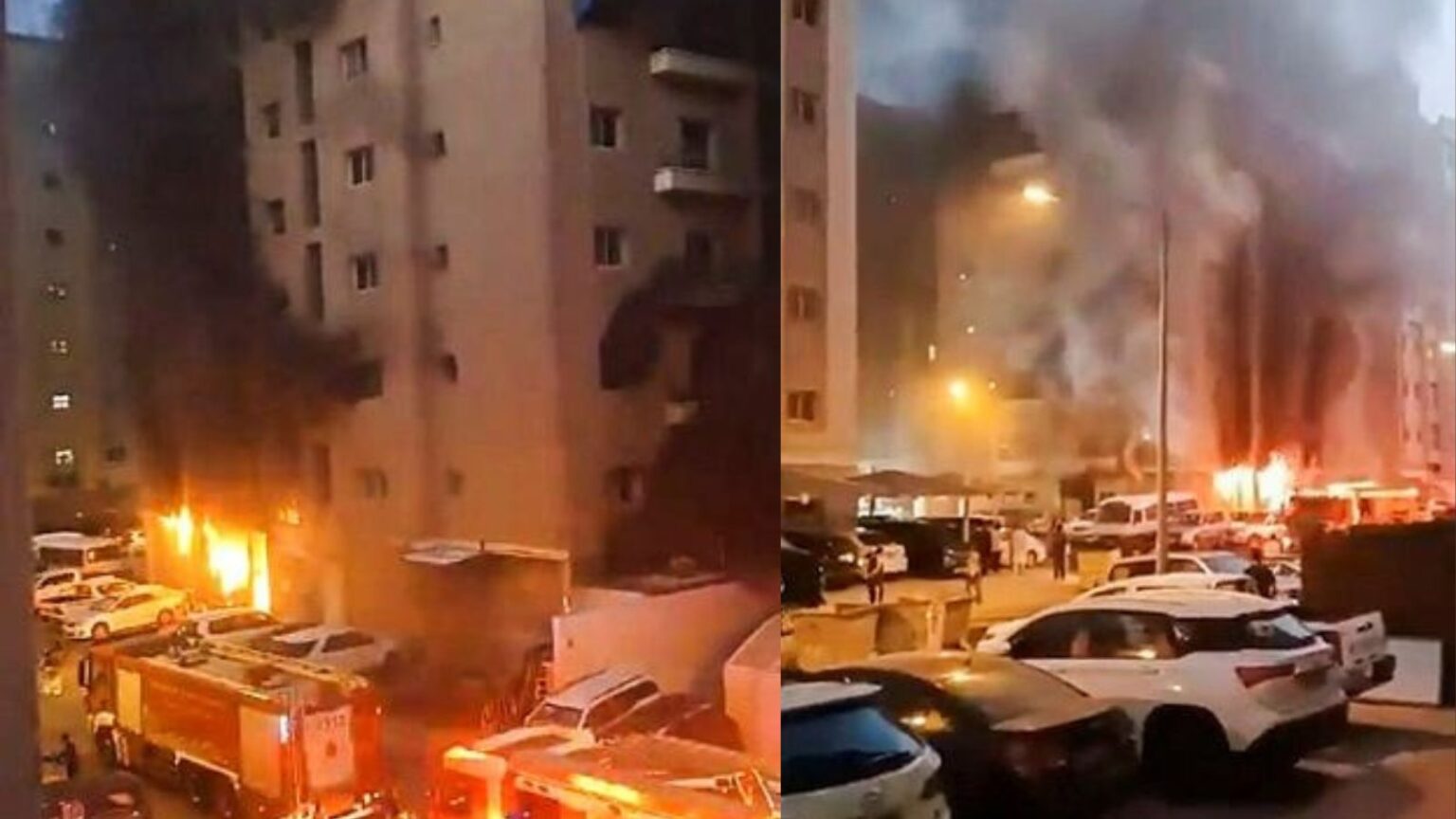Kuwait City, Kuwait
In the early hours of Tuesday morning, a devastating fire tore through a residential building in Kuwait City, resulting in the deaths of 49 foreign workers and leaving dozens more injured. The blaze, which occurred in the densely populated Hawally district, has been described as one of the deadliest incidents of its kind in Kuwait in recent years.
Table of Contents
The Fire’s Outbreak
The fire broke out at approximately 2:30 a.m. local time in a multi-story building predominantly occupied by migrant workers from South Asia and Africa. According to preliminary reports from the Kuwait Fire Service Directorate (KFSD), the fire spread rapidly throughout the ageing structure, trapping many residents inside. While the exact cause remains under investigation, initial indications suggest that faulty electrical wiring might be to blame.
Firefighters from several stations across Kuwait City fought the flames for over four hours before bringing the blaze under control. The rescue efforts were hindered by the building’s narrow hallways and lack of adequate fire safety measures, leading to numerous fatalities from smoke inhalation and burns.
Casualties and Victims
The majority of those who perished in the fire were foreign workers from countries including India, Bangladesh, Pakistan, Nepal, and various African nations. These individuals had come to Kuwait in search of better economic prospects, often working long hours in low-paying jobs such as construction and domestic work.
Dr. Abdullah Al-Sanad, spokesperson for the Ministry of Health, confirmed that 49 bodies had been recovered and that at least 70 others were injured, with several in critical condition. The injured have been taken to multiple hospitals across Kuwait City, where medical staff are working tirelessly to treat severe burns and respiratory injuries.
Reactions and Condolences
The disaster has prompted an outpouring of grief and anger both within Kuwait and internationally. High-ranking Kuwaiti officials, including Prime Minister Sheikh Ahmad Nawaf Al-Sabah, visited the scene to offer their condolences. “This is a heartbreaking loss for our community and for the many families who have lost loved ones around the world. We will ensure a thorough investigation and hold those responsible accountable,” the Prime Minister stated.
International labour organizations and human rights groups have also voiced their concerns, criticizing the living conditions and safety standards for foreign workers in Kuwait. The International Labour Organization (ILO) called for immediate reforms to enhance the living and working conditions of migrant labourers in the Gulf region. “This tragic incident highlights the urgent need for stricter enforcement of safety regulations and better living conditions for migrant workers,” said Guy Ryder, Director-General of the ILO.
Investigation and Accountability by Kuwaita Administration
In response to the tragedy, the Kuwaiti government has established a special task force to investigate the fire’s cause and assess the building’s compliance with safety standards. This task force will collaborate with international experts to identify any lapses or violations that may have contributed to the rapid spread of the fire.
Early findings from the investigation suggest that the building lacked basic fire safety equipment, such as smoke detectors, fire alarms, and emergency exits. Residents have also reported issues of overcrowding and poor maintenance, which likely exacerbated the disaster.
Kuwait’s Public Prosecutor has ordered the detention of the building’s owner and the management company responsible for its upkeep. They are being questioned about potential negligence and safety code violations. If found guilty, they could face significant penalties, including lengthy prison sentences and substantial fines.
Broader Implications and Calls for Reform
This tragic event has cast a harsh light on the conditions faced by foreign workers in Kuwait and the broader Gulf region. Many of these workers live in overcrowded, poorly maintained accommodations and are exposed to significant risks due to inadequate safety standards. The incident has reignited calls for comprehensive labour reforms and better protection for migrant workers, who play a crucial role in many Gulf economies.
Kuwait, like its neighbouring countries, relies heavily on foreign labour. Despite their essential contributions, these workers often endure harsh working conditions and have limited access to legal protections and basic services. Human rights organizations have long criticized the kafala (sponsorship) system, which ties workers to their employers and restricts their mobility and rights.
Path Forward
In the wake of this disaster, there is a growing demand for immediate and tangible changes. Advocacy groups are urging the Kuwaiti government to implement stricter building codes, ensure regular safety inspections, and improve living conditions for foreign workers. They are also calling for the abolition of the kafala system to grant workers greater freedom and protection.
As Kuwait mourns the loss of 49 lives, the country faces a critical moment. This fire has not only highlighted the vulnerabilities of foreign workers but also underscored the need for systemic changes to prevent such tragedies in the future. The hope is that this disaster will catalyze meaningful reforms, ensuring that the lives of those who contribute so much to the nation are valued and protected.
For now, the focus remains on supporting the victims and their families, providing medical care to the injured, and ensuring justice is served. The memories of those lost in this tragic fire will undoubtedly linger, prompting a renewed commitment to safeguarding the rights and well-being of all workers in Kuwait.
